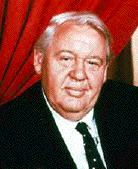July 1: Charles Laughton
Charles Laughton (1899)
It was on this date, July 1, 1899, that English-American actor Charles Laughton was born in Scarborough, Yorkshire. His fiercely Catholic mother saw that he was educated in a Catholic convent and a Jesuit school. He briefly worked in the hotel business in London until he was accepted at the Royal Academy of Dramatic Art.
While performing a play, he met the beautiful and free-spirited Elsa Lanchester, the daughter of vegetarian Socialist parents. Although Laughton’s interest in men as sexual partners was predominant, they became life-long companions. They married in a civil ceremony in 1929.
Throughout a distinguished career, Laughton performed in 41 plays and 55 films. Most memorable were his performances as the dubious father in The Barretts of Wimpole Street (1934), as Captain Bligh in Mutiny on the Bounty (1935); as an eminently correct manservant in Ruggles of Red Gap (1935), the title role in 1933’s Private Life of Henry VIII, for which he won a Best Actor Oscar; as a poignant Quasimodo in The Hunchback of Notre Dame (1939), in Alfred Hitchcock’s interpretation of Daphne du Maurier’s Jamaica Inn (1939), as a tyrannical publishing boss in The Big Clock (1948) and as an eccentric lawyer in Witness for the Prosecution (1957). In his later career, he took up stage directing, notably of The Caine Mutiny Court-Martial (1954) and George Bernard Shaw’s Don Juan in Hell (1951-1952) (which is the third act of the playwright’s Man and Superman), in which he also starred. In film, he directed the acclaimed thriller The Night of the Hunter (1955).
Biographer Simon Callow, in Charles Laughton: a Difficult Actor (1987), says Laughton’s brothers invited a procession of priests to attend the dying man, as he lay drugged and gasping for air. Laughton mused, “I wish they were more intelligent.” His wife opposed any attempt to trick him “into endorsing something he had vehemently denounced all his adult life” (p. 284). But during one of her infrequent absences, a priest was rushed in to administer extreme unction. Unable to protest, the lapsed Catholic murmured, “I think I've joined the gang.”
Charles Laughton died of kidney cancer in Hollywood on 15 December 1962, age 63. His funeral was conducted by a non-denominational chaplain. Over his wife's objection, a Unitarian choir sang “Death, Where Is Thy Sting?”
Originally published July 2003 by Ronald Bruce Meyer.


